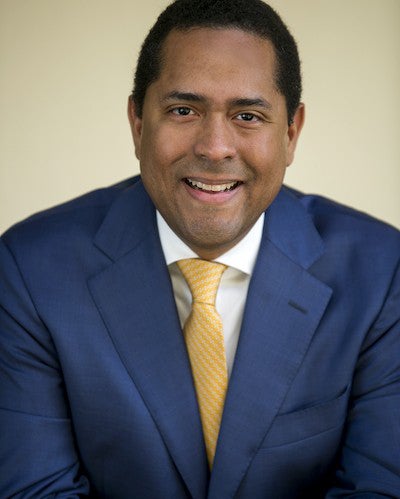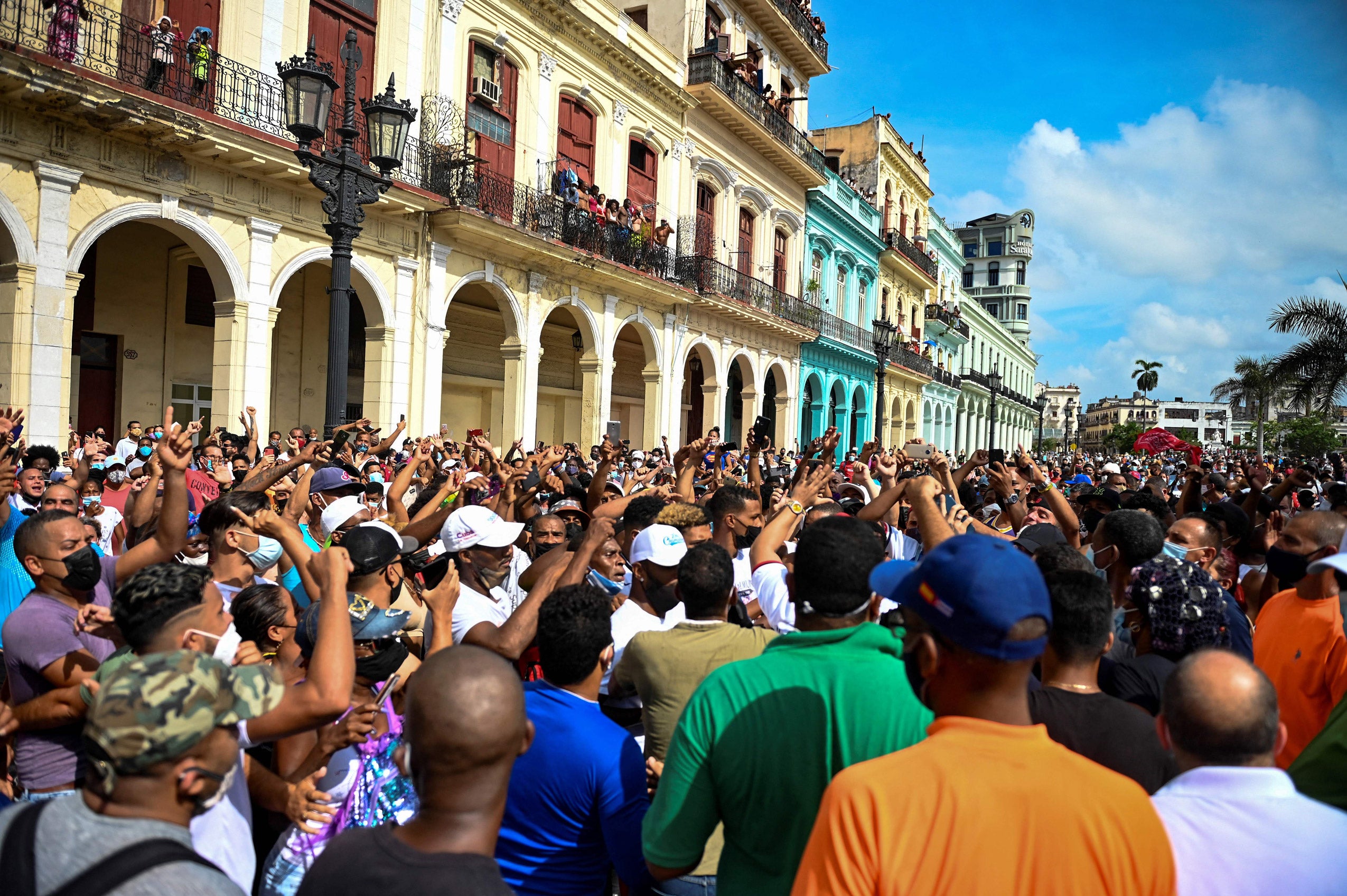For more than a week, thousands of Cubans have turned out into the streets to demand change amid a sinking economy, food shortages, power outages, and a lack of COVID-19 vaccines. President Miguel Diaz-Canel, who succeeded Raul Castro as Cuba’s president in 2018 and as leader of the Communist Party in April 2021, has placed blame for recent hardships on sanctions imposed by the United States, and denounced what he claims are the Washington-financed “counter-revolutionaries” behind the demonstrations. Meanwhile, many Cuba-watchers are wondering if this latest wave of protests, unlike those that broke out in 1994 following the end of support from the defunct Soviet Union, signal the possibility of fundamental change. Harvard Law Today recently reached out to Visiting Professor Rafael Cox Alomar ’04 to learn more about what is behind the protests, the Biden administration’s response, and whether there is likely to be a lasting impact.
Harvard Law Today: Can you briefly summarize what is happening in Cuba?
Rafael Cox Alomar: Fatally wounded by the worst economic crisis it has faced since the implosion of the Berlin Wall and the now defunct Soviet Union, Cuba stands today at the verge of a complex and uncertain crossroads. Cuba’s challenges are both exogenous and endogenous. Not only has the COVID-19 pandemic, along with the Trump Administration’s tightening of the embargo, crippled Cuba’s sluggish economy, but equally importantly the Cuban government’s failed economic and monetary policies have compounded the catastrophe even further. The Communist Party’s ideological crackdown (mostly targeted at artists and musicians opposing governmental censorship) brought matters to a head, opening the floodgates to massive protests in the streets of Cuba. At no point in its modern history has Cuba faced such a complex set of political and economic variables. Not even the foundational generations of 1868 and 1895, or even the generation witnessing the unfolding of the 1959 revolution, faced such an uncertain future.
HLT: What is causing the protests, and why now?
Rafael Cox Alomar: The immediate catalysts leading to the Cuban protests are the lack of food (and other basic goods), the shortage of COVID-19 vaccines, the constant power outages, and the overall dissatisfaction with the policies and decisions rendered by the island’s government. The timing of these unprecedented protests coincides with a significant surge in COVID-19 cases, with the accompanying implosion of the tourism and export sectors, the end of the government’s failed dollarization policy (by means of the so-called markets of “freely convertible currency”), significantly high levels of inflation, an overall contraction of 11% of the Cuban GDP, and the rising prominence of social media in the island.

Against this background, the Cuban government’s ideological purge through the enactment of Decree Law No. 349 of April 20, 2018 (imposing censure and prior restraint against musicians, painters, and other artists) not only led to the rise of the San Isidro Movement — which had been actively protesting against governmental repression and the arbitrary arrests of political dissidents all throughout 2019 and 2020 — but, more importantly, served as the backdrop for the July 11 explosion.
From a geopolitical perspective, moreover, the Cuban crisis also coincides with the end of Venezuela’s aid to Cuba (which at its apex delivered to Havana close to 99,000 daily barrels of crude oil) and with internal political rearrangements in Bolivia, Ecuador, and Brazil — Cuba’s erstwhile allies and commercial partners under the administrations of Evo Morales, Rafael Correa, and Lula da Silva. Of significance is the fact that the bilateral relationship between Havana and Washington has remained unchanged under the Biden administration — which has kept in place all the draconian sanctions leveled against Cuba by the Trump administration. As recent as May 2021, Secretary of State Anthony Blinken — as Mike Pompeo before him — included Cuba in the annual list of countries sponsoring terrorism. The Biden administration has yet to unveil its own Cuba policy.
HLT: The Cuban government alleges that the U.S. embargo is responsible for the hardships Cubans are experiencing. Is that right?
Rafael Cox Alomar: The U.S. embargo, as a threshold matter, is a relic of the Cold War dating back to the waning days of the Eisenhower administration. It is, in essence, a failed policy in need of serious reassessment. Far from leading to regime change in Havana, the embargo is condemning millions of Cubans to the most abject misery. Not only it is inconsistent with the United States’ international human rights obligations, but it runs counter to American domestic and foreign policy interests. Washington’s most recent restrictions on remittances, travel, banking, financial services, and trade are asphyxiating the average Cuban citizen. This notwithstanding, and contrary to the Cuban government’s narrative, the July 11 protests were not the exclusive byproduct of the embargo alone. There is ample evidence to suggest that the Cuban people are demanding the end of the island’s politico-constitutional model.
HLT: Does the fact that there is no longer a Castro nominally in power play any role? How tied are the younger generations of Cuba to talk of the revolution? After nearly 70 years, is staying true to the revolution still an animating idea?
Rafael Cox Alomar: The death of Fidel Castro in 2016, along with Raúl Castro’s retirement from the presidency of the Council of State and the chairmanship of the Communist Party in 2018 and 2021, respectively, marked the end of an era in Cuban life. The cycle that began in 1953 with Fidel’s attack to the Moncada barracks, and which culminated with the triumph of the 1959 Revolution, has come to an end. A new generation of Cubans born and raised after 1959 in the post-Cold War period, who did not live through the excesses of the Fulgencio Batista years (1932-1944, 1952-1958), is now demanding transformative change. The Communist high command ought to pay heed to this inescapable reality. Interestingly, it has been the youth of Cuba (the island’s “new pine trees” in the words of the Apostle of Cuban independence José Martí), along with their art and music (“Patria y Vida”), bearing the brunt (some from jail) of this ferocious ideological confrontation.
HLT: There were similar protests after the fall of the Soviet Union ended a vital measure of support for the Castro regime. Are there any parallels here?
Rafael Cox Alomar: The July 11 disturbances bear no significant substantive resemblances to the so-called Maleconazo of 1994. The Maleconazo was circumscribed mostly to Havana — contrary to this most recent outburst that encompasses the entirety of the Cuban geography. While the leitmotif of those leading the Maleconazo episode was fleeing Cuba altogether, the driving force behind the July 11 disturbances appears to be effecting systemic change from within.
HLT: What is the chance this is a turning point, that it may lead to some kind of fundamental change in the way Cuba is governed?
Rafael Cox Alomar: Whether this episode constitutes a turning point in Cuban life is difficult to say. Cuba’s political opposition appears significantly fragmented; lacking a discernible strategy and leadership — indispensable elements for achieving long-term success. Yet, the July 11 protests have no precedent in recent history and may very well signal the coming of age of a more effective opposition.
HLT: What approach should the Biden administration take? If it vocally supports the protesters, is there a risk of feeding into the rhetoric that this is all just a U.S.-sponsored plot, possibly turning some Cubans away?
Rafael Cox Alomar: In articulating a policy for Cuba, the Biden administration faces a particularly complex conundrum with far-reaching foreign and domestic repercussions. The White House would be well advised to reassess the Trump era’s more punitive sanctions — those hurting the Cuban people the most — while constructively engaging Cuba’s more progressive voices. Charting a path for the Washington–Havana bilateral relationship has proven a trying task since the founding of the American Republic. Since the days of Jefferson, Cleveland and McKinley, all the way to the Eisenhower, Kennedy, and Obama years, deciding how to engage Cuba has proven a labyrinthic assignment. And this time around will be no different, as President Biden has no doubt found out.
